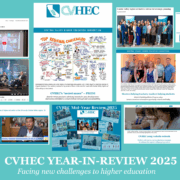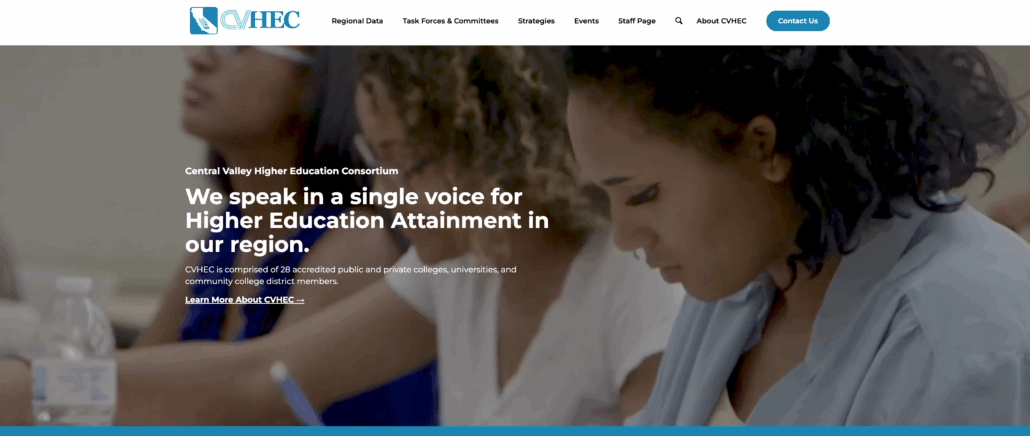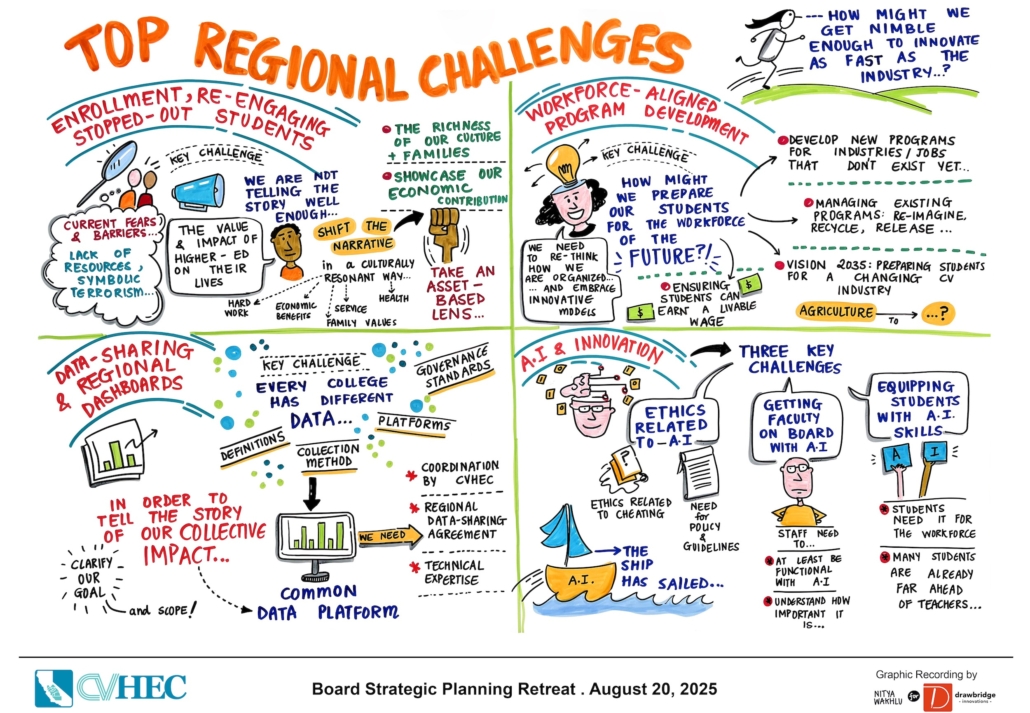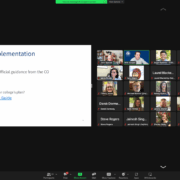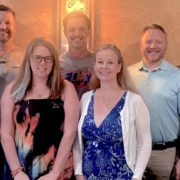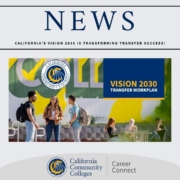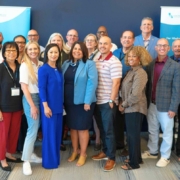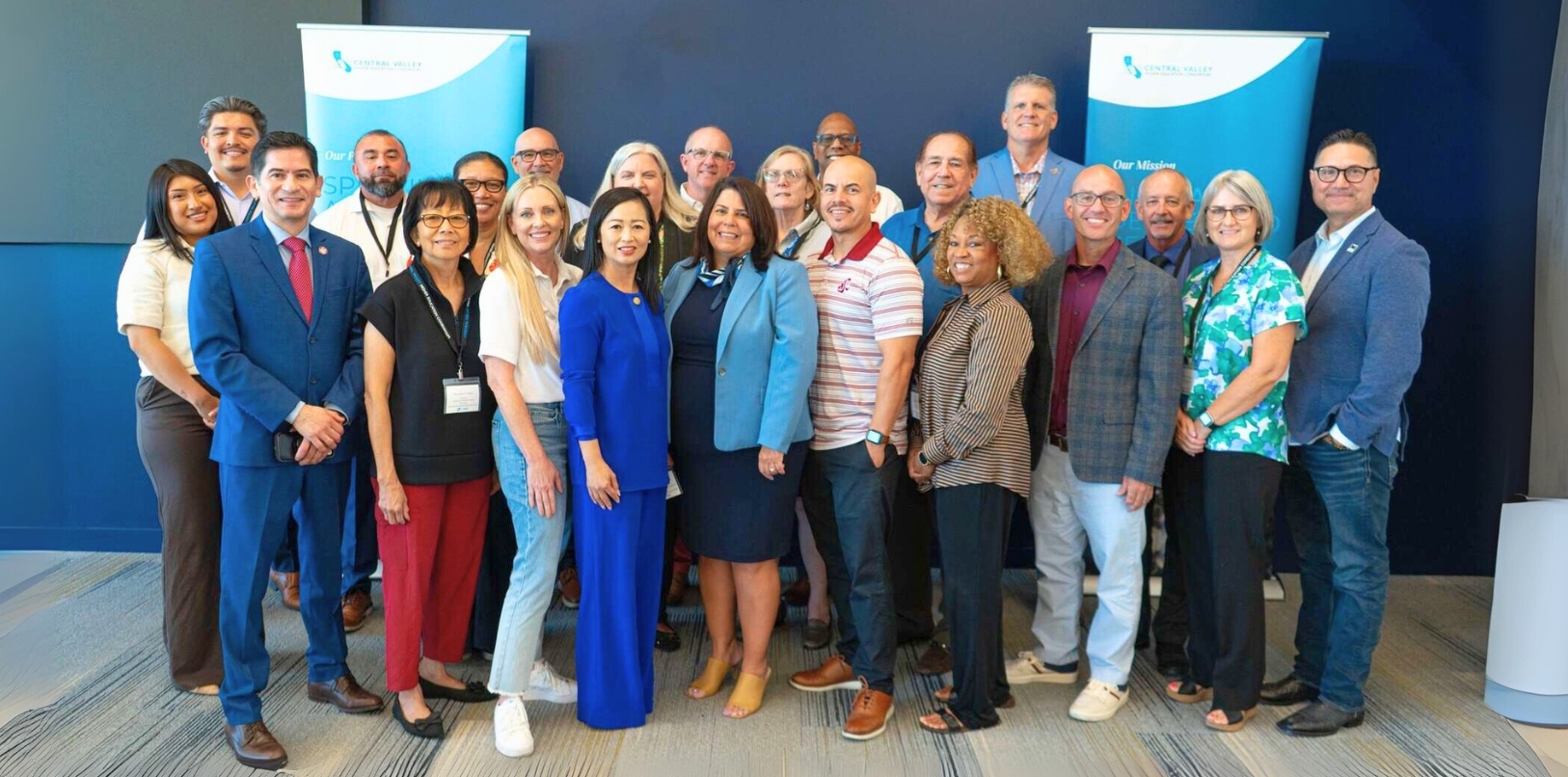CVHEC website refresh: “a sense of recommitment” that showcases the recent forward momentum of the consortium with its 25th anniversary approaching in two years.
Update underscores communications campaign
to enhance the region’s college-going culture
(NOV. 12, 2025) — As part of an ongoing branding upgrade, the Central Valley Higher Education Summit rolls out its 2025 website refresh this month designed to enhance user friendliness and showcase the recent forward momentum of the consortium with its 25th anniversary approaching in two years.
“This refresh underscores the momentum we have established in the past few years such as our new logo last fall, the board retreat this summer identifying four new goals and the continuation of scalable work we have undertaken in various areas such as dual enrollment, transfer and our math and English task forces and communications such as our e-newsletter,” said Dr. Benjamín Durán, CVHEC executive director.
Angel Ramírez, CVHEC associate director who has spearheaded the consortium progress with Duran since he began as an intern in late 2014, calls it “a sense of recommitment.”
“Our website update reflects the momentum we’ve built as a region. We’re coming together with new energy and focus to strengthen partnerships and keep building on the college-going culture that supports every student in the Central Valley,” Ramírez said.
The website blends the conventional features with specific consortium strategies such as:
- About CVHEC: highlights the consortium’s 28-institutions of higher education membership demonstrating its reach across the Central Valley’s 10-county region.
- Board of Directors: presents the CEOs of each member institution who make up the CVHEC board and provides timely updates on top leadership changes in the region.
- “What the CV-HEC is Happening” Blog: first person informal updates on CVHEC initiatives and priorities with a personalized “behind the scenes” feel.
- Regional Data page: capturing and presenting pertinent data essential to strategy success.
- News: the monthly CVHEC e-newsletter reporting the latest CVHEC happenings as well as news about members, the valley’s higher ed scene in general and national updates. The newsletter publishes monthly except June-August when one special summer edition is published in early August.
- CVHEC Team: featuring CVHEC’s 11-member internal team that includes the addition in recent years of Dr. Kristin Clark, WHCCC chancellor-emerita; Dr. Lori Bennett, president-emerita of Clovis Community College; Elaine Cash, retired Riverdale School District superintendent; and administrative specialist Priscilla Arrellano.
- Events: CVHEC events and a community calendar of events of interest to the valley’s higher ed community.
- Contact Us: avenues for seeking more information about CVHEC’s work and for input or for assistance with something specific in higher education.
Customized strategy features that chronicle CVHEC’s various initiatives and emphasize the consortium’s focus include such pages as:
- Central Valley Dual Enrollment: shows the history and the work the consortium team members and partners have accomplished across the region to help students get an academic and economic headstart on college while in high school.
- Central Valley Math Bridge: a strategic initiative designed to align high school and college math pathways, creating a smooth and supported transition for students.
- Central Valley Transfer Project: increasing transfers from Central Valley community colleges to the region’s four-year universities that promotes the efficient Program Pathways Mapper.
- Master’s Upskilling Program: providing high school teachers the opportunity to upskill from a bachelor’s to master’s degree that meets the minimum quals to teach dual enrollment English and math courses at their respective high schools (page in development).
The website also features pages showcasing how boots-on-the-ground higher ed professionals in the region help accomplish these CVHEC strategies through committees and task forces:
- Math Task Force: streamlining and redesigning math pathways for student success.
- English Task Force: streamline English pathways for students by examining topics, concerns, and recent legislation.
- CVDEEP Task Force: a growing list of dual enrollment professionals collaborating to blur the lines between high school and higher ed (page in development).
- PIO/Communications Committee: communications professionals (public affairs specialists and public information officers) representing each of the consortium’s 28-member institutions of higher ed working collaboratively to develop and advance a unified voice for the board, made up of each of their campus CEOs, regarding CVHEC initiatives and the general promotion of higher education in the Central Valley. Also provides a resource to news media journalists seeking to reach the valley’s higher ed media relations contacts with links to their respective news pages.
Ramirez said next stages of development include building out the Masters Upskilling Program and CVDEEP pages.
“Like any website, it’s a work-in-progress so we encourage viewers to keep an eye out for ongoing upgrades and updates announced in our monthly e-newsletter,” he said.
Overall, Ramírez cites the web refresh as a symbol of the consortium’s forward thrust in this issue’s “What the CVHEC Happening Blog,” where he reflects on his 10th anniversary.
“Launching our newly refreshed website, building on the momentum of last year’s new logo – it isn’t just a design update; it’s a statement that CVHEC is stepping forward, more visible, more confident, and ready to lead,” he writes. “Seeing it all come together made me pause and realize that this is what growth looks like. Not just bigger programs, but a stronger identity, a renewed purpose, and a clear sense of direction.”
He also said a video documentary chronicling the CVHEC story is currently in progress and set for release in the spring as part of the communications component he began when he first joined CVHEC that included bringing in retired Fresno State public affairs specialist Tom Uribes in 2020 to coordinate communications and media relations and help build the consortium presence in general.
CVHEC’s “secret sauce” — PRIDE
Board champions identified to ensure follow-through and accountability
Following up its recent one-day Strategic Planning Retreat, the Central Valley Higher Education Consortium (CVHEC) Board of Directors announced the development of four key areas of focus for the next three to five years and the formation of advisory boards to champion progress in each area.
The four advisory boards are: Data Sharing and Regional Dashboards; Workforce Aligned Program Development; Artificial Intelligence (AI); and Enrollment, Reconnect.
The advisory boards were created during the CVHEC Board retreat Aug. 20 when the leaders from colleges and universities across California’s Central Valley gathered at the University of California, Merced to chart a bold course for the next three to five years.
The boards consist of chancellors, presidents and campus directors of the Central Valley’s 28 institutions of higher education who make up the CVHEC Board of Directors.
In welcome remarks to the leaders at the retreat, CVHEC board chair Dr. Juan Sánchez Muñoz, chancellor of University of California Merced, said, “We need to work together to support our students. We’re here to create a vision for how we celebrate.”
Facilitated by Nitya Wakhlu and Greg Netzer of Drawbridge Innovations, the retreat emphasized interaction and problem-solving. Prior to the retreat, board members participated in a survey identifying regional challenges most pressing to their institutions.
During the session, participants divided into small groups to tackle those challenges. Using structured templates, they explored questions such as:
- What is the core challenge we need to solve?
- Who is impacted, and what are we hearing from stakeholders?
- What role should CVHEC play, and how can institutions collaborate?
- What barriers exist, and what resources are needed?
Each group developed a “challenge charter” and presented their ideas to the full board.
Using a dot-voting process, members prioritized three to five strategic initiatives for CVHEC to pursue over the next three to five years. Champions were identified for each initiative to ensure follow-through and accountability.
The group arrived at CVHEC’s “secret sauce” — PRIDE:
PARTNERSHIPS – unique CVHEC structure and membership collaboration
RESPONSIVE LEADERSHIP – we make decisions, having the CEO’s in the room with equal voice working on challenges that matter
IDENTITY – THE CVHEC WAY – doing things with a unique approach, being a national role model
DEMOGRAPHICS AND RESEARCH – serving the most underserved communities of our region
EXTERNAL INVESTMENT – our unique structure, focus, and work make us attractive for external investment
“This was the consortium at its best,” said Dr. Benjamín Durán, CVHEC executive director. “We saw CEOs from across the Valley not only identify shared challenges but also commit to being part of the solution. That’s the spirit of CVHEC.”
The advisory boards and their current members (membership in progress):
WORKSTREAM 1: Data Sharing and Regional Dashboards
Dr. Lena Tran, chancellor – YCCD (sp)
Dr. Britt Rios-Ellis, president – Stanislaus State
Dr. Carole Goldsmith, chancellor – SCCCD (sp)
Dr. Sean Hancock, president – COS
WORKSTREAM 2: Workforce Aligned Program Development
Dr. Jerry Buckley, president – Reedley College
Eddie Cunha, campus director – National University
Dr. Chad Redwing, president – Columbia College
Dr. Carla Tweed, president – Coalinga College
Primavera Monarrez, interim president – Porterville College
Dr. Vernon Harper, president – CSUB
WORKSTREAM 3: Artificial Intelligence (AI)
James Preston, president – Lemoore College
Dr. Saúl Jiménez-Sandoval, president – Fresno State
Dr. Angel Reyna, president – Madera College
Dr. Jose M. Barral Sanchez, dean – UCSF-Fresno Center
Dr. Lisa Aguilera Lawrenson, president – College
WORKSTREAM 4: Enrollment, Reconnect
Dr. Kim Armstrong, president – Clovis Community College
Dr. Stacy Pfluger, president – Bakersfield College
Dr. Leslie Minor, president – Taft College
Dr. Eddie Cunha, campus director – National University
Insights
After the retreat, board members shared the following reflections:
“Thank you Ben, Angel, and the CVHEC team for bringing us all onto the same page, and reminding us of what CVHEC can do,” said Chancellor Juan Sánchez Muñoz, UC Merced .
“It’s always powerful when you see CEO’s ‘finding common vision and strength’,” said Kristin Clark, CVHEC (West Hills Community College District chancellor-emeritus and former CVHEC board chair).
“CVHEC is an opportunity to come together, share and be restored in community,” Merced College President Chris Vitelli said.
“I am excited about the AI conference and the applications it can have in the classroom,” said President Angel Reyna of Madera Community College.
The Central Valley is definitely “valley strong,” but we also are “valley kind … people are generous and free to give,” said Stanislaus State President Britt Rios-Ellis.
“There’s nothing as dope as this work here,” said Fresno City College President Denise Whisenhunt.
“Excited to keep this work going,” said Fresno State President Saúl Jiménez-Sandoval.
Central Valley colleges gear up for fall
CVHEC Task Forces continue collaborative work to support equitable student outcomes
BY DR. JOHN SPEVAK
CVHEC Project Lead – Merced College Vice President-emeritus
As the fall 2025 semester unfolds, the Central Valley Higher Education Consortium (CVHEC) is once again turning its attention to two of the most persistent hurdles in student success: mathematics and English through two task forces established in the past seven years.
Beginning later this month, CVHEC’s Math Task Force and English Task Force — both consisting of at least one English and one math professor from each of the 15 CVHEC member community colleges in the 28-member consortium — will re-convene educators from across the Central Valley’s 10-county region in a new round of virtual meetings this fall, bringing renewed energy to collaborative solutions that help students succeed in gateway courses.
The Math Task Force, which started as 15 members and has expanded to more than 75 participants, will meet in a series of three Zoom convenings related to implementation of AB 1705 and the 15-member English Task Force is planning one meeting devoted to artificial intelligence.
The task forces, by sharing concerns and best practices, have helped Central Valley community colleges make a significant transition in pedagogy, shifting from a focus on student weaknesses to one on student strengths. The upcoming gatherings will continue a tradition of faculty-led innovation that has become a hallmark of the consortium’s work in recent years.
For the English Task Force, one Zoom meeting, “The Challenges and Opportunities of AI for English Professors in the Central Valley,” is scheduled for Wednesday, Oct. 29, from 3 to 4:30 p.m.
At the three Math Task Force sessions, Central Valley math professors will share their progress following two-plus years of discussing implementation of the state law in hybrid convenings that were entitled “The Central Valley Way for AB 1705” which included college research and data experts, deans and academic leaders from higher ed as well as from K-16 school districts with support from the Charles A. Dana Center at the University of Texas at Austin. The 2025-26 academic year is the first year AB 1705 must be implemented.
Each MTF virtual session is from 10 a.m. to noon:
- Friday, Oct. 24 – “Calculus with a Corequisite” led by Professor Jeremy Brandl of Fresno City College
- Friday, Nov. 7 – “Innovative One-Course Prerequisite” led by Professor Shelley Getty of Taft College;
- Friday, Nov. 21 – “Data Collection and Analysis” led by Professor Nathan Cahoon of Taft College.
Professor Cahoon broke his group’s focus down further noting that a central tenet of AB 1705 and 705 has been to expand student choice.
“As we enter the validation phase for the one- and two-semester calculus precursors, it is essential to review the standards established by the Chancellor’s office,” Prof. Cahoon said.
He explains that the pass rate for students in the precursor classes and in the lowest tier must meet or exceed 50 percent, whereas the pass rate for direct placement, lowest-tier calculus students is 15 percent.
“The goal of this group is to ensure that the data collected and analyzed by the state is accurate,” he said. “There is still concern over previous research conducted by the RP group, and we look to validate the data they collected. A central tenet of AB 1705 and 705 has been to expand student choice. We hope to maintain student choice by preserving the option to take precursors to calculus as they choose.”
CVHEC formed the two groups soon after the passage of California Assembly Bill 705 in 2017 which mandated the elimination of remedial English courses and allowed students to go directly into transferable English courses.
That legislation also increased the options of transferable math courses students could take; mandated the elimination of remedial math courses for entrance into statistics and similar courses; and allowed students to go directly into transferable statistics and similar courses.
And it encouraged increased support for students, including corequisite courses.
The more recent passage of AB 1705, an amplification of AB 705, affected math more than English by expanding AB 705 to include STEM math courses. The Math Task Force continues to work, through sharing and collaboration, toward finding ways to allow the largest numbers of students to go into transferable calculus courses and, when necessary, pre-calculus courses.
AB 1705 went into effect this fall 2025 semester and gives community colleges two years to implement new math courses, including Calculus I with a corequisite and, for each college, one innovative pre-calculus course. At the end of those two years, the California Community College Chancellor’s office will determine if each college has submitted sufficient data to verify the effectiveness of the new courses.
Meanwhile, the English Task Force continues to work, also through sharing and collaboration, toward continuous improvement in teaching and learning in English courses. In ETF meetings during the last two years, much time was spent talking about artificial intelligence.
Discussions like this about AI have been happening across all disciplines, but they are especially important for English professors, since they work at having students not only read and think critically on their own but also write in their own personal voice.
The CVHEC Math and English Task Forces represent one of the consortium’s most impactful strategies: creating faculty-led communities of practice that span institutions and sectors; serving as a collaborative space for faculty to discuss curriculum alignment, address equity gaps and share best practices.
For CVHEC Executive Director Dr. Benjamín Durán, the task forces underscore the consortium’s methodology of collective problem-solving across the Valley – a region-wide commitment to what the consortium calls “The Central Valley Way” towards achieving its mission of enhancing a college-going culture in the region.
“When faculty come together across campuses, they create solutions that no single institution could achieve alone,” Dr. Durán said. “That’s what makes these task forces so powerful for our region and, most importantly, for our students across the Central Valley. For them, the results of this work may mean not only passing a math or English class but truly unlocking the path to transfer, degree attainment and career success.”
Dr. Durán adds that CVHEC has been pleased to convene the task forces and to help facilitate meetings “because the consortium believes in the talent of Central Valley Math and English Task Force professors and their ability to respond to challenges and opportunities effectively as they create a positive ‘Central Valley Way to Student Success’ for their math and English students.”
Also see:
Wrap up: CVHEC Math Task Force Convening Mar. 28
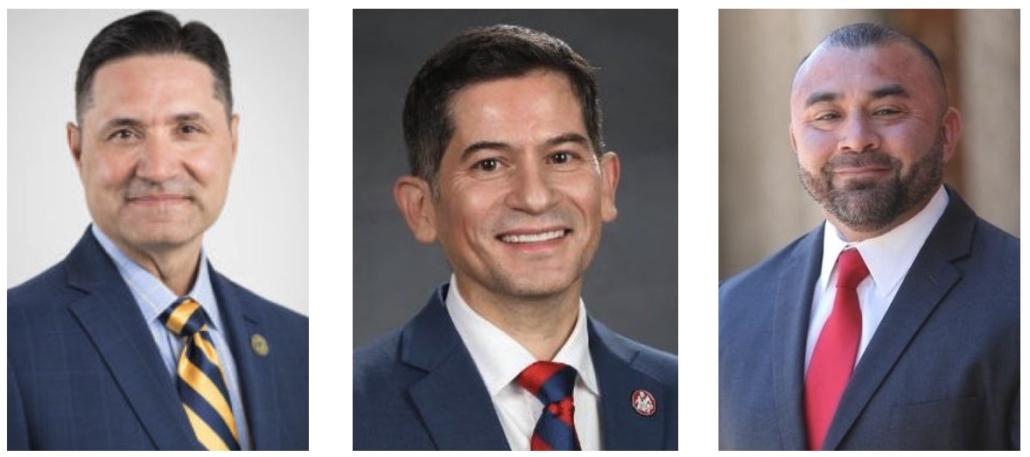
Reelected to the CVHEC Board of Directors Executive Committee for one-year terms that began Oct. 1: University of California Merced Chancellor Juan Sánchez Muñoz, Fresno State President Saúl Jiménez-Sandoval and West Hills Community College District Chancellor Robert Pimentel.
Chancellors Muñoz, Pimentel and President Jiménez-Sandoval get new three-year terms
Three Central Valley higher ed leaders were re-elected to new three-year terms on the executive committee of the Central Valley Higher Education Consortium Board of Directors effective Oct. 1, announced Dr. Benjamín Durán, CVHEC executive director.
Dr. Juan Sánchez Muñoz, chancellor of University of California Merced, who is currently serving a one-year term as chairperson for the board that began in January, was re-elected to the executive committee along with Fresno State President Saúl Jiménez-Sandoval and West Hills Community College District Chancellor Robert Pimentel. The previous three-year terms for all three expired Sept. 30.
The CVHEC Board of Directors consists of the chief executive officers of 28 institutions of higher education in the valley’s 10-county region that comprise the consortium membership. The executive committee conducts business on behalf of the board when it is not available, especially for timely or urgent matters, and sets the agenda for board business, Durán said.
Per CVHEC bylaws, each higher education segment has a set number of representatives on the committee who are elected by the full board of directors. Seven executive committee members serve three-year terms beginning in October the first year.
“The executive committee acts as a smaller, more agile governing body, often handling operational issues and strategic planning between full board meetings, and serving as a sounding board for CVHEC internal leadership,” Durán explained.
The full board meets quarterly with the next session being planned for an early December target date, said Ángel Ramírez, CVHEC associate director.
Executive meetings are also held four times a year prior to board meetings with the first meeting of the 2025-26 executive committee planned for early November at UC Merced where the committee will vote to fill the secretary, treasurer and chair position from among its membership, Ramírez said.
At the recent CVHEC board retreat in August, Chancellor Sánchez Muñoz welcomed the valey higher ed leaders and said about CVHEC’s next steps, “We need to work together to support our students. We’re here to create a vision for how we celebrate.” [
President Jiménez-Sandoval said, “Being reelected for three more years to the executive board of CVHEC is a tremendous honor, as it allows us to continue our noble work in our Valley. This continuity of leadership will allow us to be intentional about our resolve to harness the power of AI, build a strong pipeline between community colleges and four-year institutions, and promote the power of higher education.”
The membership of the 2025 CVHEC Executive Committee by segment with their terms noted is:
• CALIFORNIA STATE UNIVERSITIES (2)
President Saúl Jiménez-Sandoval, Fresno State (2025 –2028)
President Britt Rios-Ellis, CSU Stanislaus (2024 –2027)
• CALIFORNIA COMMUNITY COLLEGES (3)
NORTH – President Chris Vitelli, Merced College (2024 –2027)
CENTRAL – Chancellor Robert Pimentel, West Hills Community College District (2025 –2028)
SOUTH – President Brent Calvin, College of the Sequoias (2024 –2027)
• UNIVERSITY OF CALIFORNIA (1)
Chancellor Juan Sánchez Muñoz, UC Merced ( 2025 –2028)
• PRIVATE/INDEPENDENT (1)
President Andre Stephens, Fresno Pacific (2024 –2027)
The CVHEC Board of Directors and team members convened Aug. 15 at UC Merced for a hybrid strategic planning retreat. Attending in person: (FRONT): Fresno State President Saúl Jiménez-Sandoval; CHSU President Flo Dun; Coalinga College President Carla Tweed; YCCD Interim Chancellor Lena Tran; San Joaquin Delta College Superintendent/ President Lisa Aguilera Lawrenson; Madera Community College President Ángel Reyna; Clovis Community College President Kim Armstrong; Merced College Superintendent/ President Chris Vitelli; CVHEC Dual Enrollment Lead Kristin Clark; UC Merced Chancellor Juan Sánchez Muñoz. (MIDDLE): CVHEC Admin Assistant Priscilla Arellano; Fresno City College President Denise Whisenhunt; Bakersfield College Interim President Stacy Pfluger; Taft College Acting Superintendent/ President Leslie Minor; CVHEC Executive Director Benjamín Durán; Reedley College President Jerry Buckley. (BACK): CVHEC Associate Director Angel Ramirez; WHCCD Chancellor Robert Pimentel; Lemoore College President James Preston; Modesto Junior College President Brian Sanders; Fresno Pacific University President André Stephens; College of the Sequoias President Brent Calvin. (Photo: Juan Rodriguez – UCM).
CVHEC board sets direction for next 3-5 years
with collaborative focus on student success
BY TOM URIBES
CVHEC Communications/Media Lead
Leaders from colleges and universities across California’s Central Valley gathered at the University of California, Merced for a one-day Strategic Planning Retreat hosted by the Central Valley Higher Education Consortium (CVHEC) Board of Directors Aug. 20.
The session marked an important milestone in the consortium’s 23-year history, as presidents, chancellors and higher education CEOs from across the region came together to chart a bold course for the next three to five years, said Dr. Benjamín Durán, CVHEC executive director, .
“This was a ‘roll up your sleeves’ kind of day,” Durán said, reflecting the spirit of the retreat. “It was about open discussion, candid collaboration, and making decisions that will set the state and direction for CVHEC in the years to come.”
A Trusted Voice for Higher Education Advocacy and Collaboration in the Valley
Hosted by UC Merced Chancellor Juan Sánchez Muñoz, the retreat began with welcome remarks that underscored the importance of regional collaboration in advancing higher education opportunities.
The day carried special significance as participants reflected on CVHEC’s origins. Founded at California State University, Fresno under the leadership of President-Emeritus John Welty, the consortium has grown into a trusted voice for higher education advocacy and collaboration in the Valley.
Current Fresno State President Saúl Jiménez-Sandoval noted in a social media post after the event the historical connection he found in reminiscing about his predecessor.
“This is a deeply meaningful program to our university and region,” President Jiménez-Sandoval said. “It represents not just a partnership but a shared responsibility to lift up the Central Valley through education. I look forward to our continued intentional collaboration on so many areas — from AI to transfer pathways to joint research projects.”
The retreat agenda featured a presentation by Durán and Ángel Ramírez, associate director, who revisited CVHEC’s founding story and outlined its core purpose: strengthening higher education access and success across the Central Valley.
“When institutions across the Valley work together, we amplify our impact for students, families, and communities,” said Ramírez, who previewed a draft of a video currently in progress telling the CVHEC story.
Their presentation highlighted the consortium’s current initiatives, including:
- The Central Valley Transfer Project, streamlining student movement between community colleges and universities.
- Expansion of dual enrollment programs.
- And Math alignment efforts including the Math Task Force and CV Math Bridge work.
Dr. Kristin Clark, chancellor -emeritus of the West Hills Community College District participating as a former CVHEC board member, reinforced CVHEC’s uniqueness. She served on the board including as chair until her retirement from WHCCD last year.
“The CVHEC Board of Directors is made up of CEOs. That’s powerful,” she said. “It means we have the ability to drive collective impact at the highest levels of our institutions. We are not duplicating anyone’s work. We are doing what no single institution can do alone. That’s why this board matters.”
Collaborative Workshops: From Challenges to Solutions
Facilitated by Nitya Wakhlu and Greg Netzer of Drawbridge Innovations, the retreat emphasized interaction and problem-solving. Prior to the retreat, board members participated in a survey identifying regional challenges most pressing to their institutions.
During the session, participants divided into small groups to tackle those challenges. Using structured templates, they explored questions such as:
- What is the core challenge we need to solve?
- Who is impacted, and what are we hearing from stakeholders?
- What role should CVHEC play, and how can institutions collaborate?
- What barriers exist, and what resources are needed?
Each group developed a “challenge charter” and presented their ideas to the full board. Using a dot-voting process, members prioritized three to five strategic initiatives for CVHEC to pursue over the next three to five years. Champions were identified for each initiative to ensure follow-through and accountability.
“This is the hard part,” said Wakhlu with a smile. “It’s easy to generate ideas. It’s harder to commit to action. But today you’ve done both.”
“This was the consortium at its best,” Dr. Duran said. “We saw CEOs from across the Valley not only identify shared challenges but also commit to being part of the solution. That’s the spirit of CVHEC.”
Building Toward the Future
The retreat outcomes included:
- Stronger relationships among member CEOs.
- Deeper understanding of CVHEC’s history and ongoing work.
- Clear priorities for regional collaboration.
- Champions stepping up to lead the next phase of CVHEC initiatives.
In addition to the retreat, UC Merced staff offered participants a guided campus tour, showcasing the university’s growth and commitment to serving the Valley.
Reflecting on the day, Associate Director Ramírez expressed optimism for what lies ahead.
“This was more than just planning,” Ramírez said. “It was about reaffirming our shared purpose and commitment in CVHEC’s work. Together, we can expand opportunities and outcomes for every student we serve.

